Helping Teen Girls Find Their Voice and Thrive
- Tama Hamilton-Wray, Ph.D.
- Associate Professor
- Residential College in the Arts and Humanities
Project Overview
- Tama Hamilton-Wray and her students collaborate with the Lansing nonprofit Grit, Glam, and Guts (GGG) on initiatives that empower teen girls to gain higher self-awareness, develop a healthy self-identity, and recognize and engage in the power of their voice.
Products/Outcomes
- As part of a Community Engagement: Narrative Portraits course, MSU students researched Black girlhood studies while engaging with GGG participants in weekly chapter meetings and a visit to MSU.
- During the GGG Summer Residential Program, held in partnership with the Residential College in the Arts and Humanities, teen girls attended college-level lectures, connected with professional women, and engaged in activities focused on civic engagement, artistic expression, empowerment, and character building.
Partner
Form(s) of Engagement
- Community-Engaged Research
- Community-Engaged Teaching and Learning
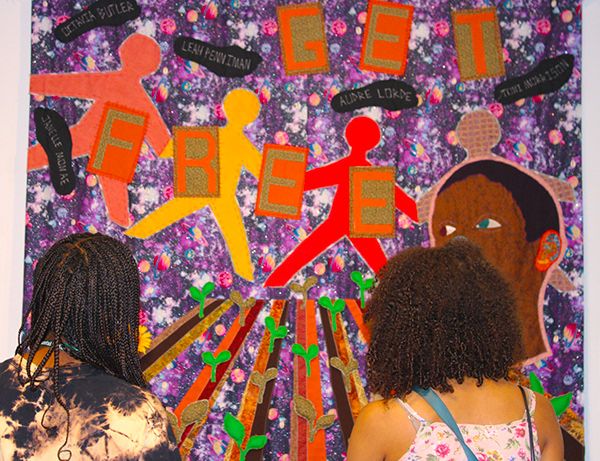
Members of Grit, Glam, and Guts explored the Afrofuturism exhibit at MSU Museum during a 2024 residential summer camp on campus.
Photo by Dominique Pruitt-Wright
A young woman became emotional as she shared what it meant to her to be a part of Grit, Glam, and Guts (GGG) at a fundraiser for the Lansing-based organization that seeks to inspire, equip, and empower teen girls.
“She said, ‘I’m so grateful for the community,’ because it taught her first to love herself and to love her skin,’’ recalled GGG founder Cameo King, recounting the powerful moment. While GGG is open to all, the focus is on the experiences of Black girls.
“It just tore everybody up in the room, because I think we all have those experiences in life where it is something about ourselves that society tells us isn’t valuable, isn’t worthy, or that we shouldn’t like,” King said. “And for this young lady—and for a lot of young ladies—it was her skin color. For somebody else, it could be their hair. It could be their nose. It could be their lips. It could be their body.”
That can be especially true for Black girls, who face more and harsher discipline in schools than their white counterparts. “They are criminalized, sexualized,” King said. “And oftentimes they are simply not cared for and nurtured.”
GGG offers weekly chapters (meetings), a Black Girl Day of Play, and an annual summer camp at Michigan State University. The goal is to help young women ages 12-17 gain higher self-awareness, develop a healthy self-identity, and recognize and engage the power of their voice.
“We wanted to be so intentional about creating a space where Black girls know they are loved, where they are affirmed. And that they get the tools to navigate what life brings at them,” King said.
A Partnership with RCAH
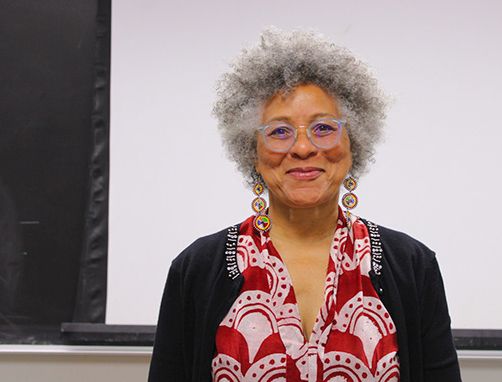
Tama Hamilton-Wray
Photo by Dominique Pruitt-Wright
GGG has a longstanding partnership with MSU’s Residential College in the Arts and Humanities (RCAH). When Kevin L. Brooks, a former academic specialist for diversity and civic engagement at RCAH, left MSU, he asked colleague Tama Hamilton-Wray to step in.
Even though she already had a full plate as a filmmaker and an associate professor of Africana film studies, Hamilton-Wray agreed to oversee his mentee’s senior thesis. Aaliyah Buell had been working as an intern at GGG. Her thesis focused on cultivating safe spaces for Black women and girls in professional and academic settings.
Hamilton-Wray knew Buell well, having recruited her to RCAH during a 2018 RCAH course community engagement project Hamilton-Wray led at her high school. As Buell’s senior mentor, she wanted to learn more about GGG, so she visited the program and sat in on weekly teen-led chapters.
“The girls blew me away,” she recalls. “Their leadership skills astound me...their creativity ... how they see the world and what they’re bringing to the table.”
Hamilton-Wray was hooked. Those visits sparked a fruitful, reciprocal partnership between Hamilton-Wray, RCAH, and GGG. In 2022, she and Buell, who has since graduated and is now assistant director of GGG, collaborated on an MSU Creating Inclusive Excellence Grant proposal to support an MSU residential camp for teen girls from throughout Michigan.
A Community-Engaged Course
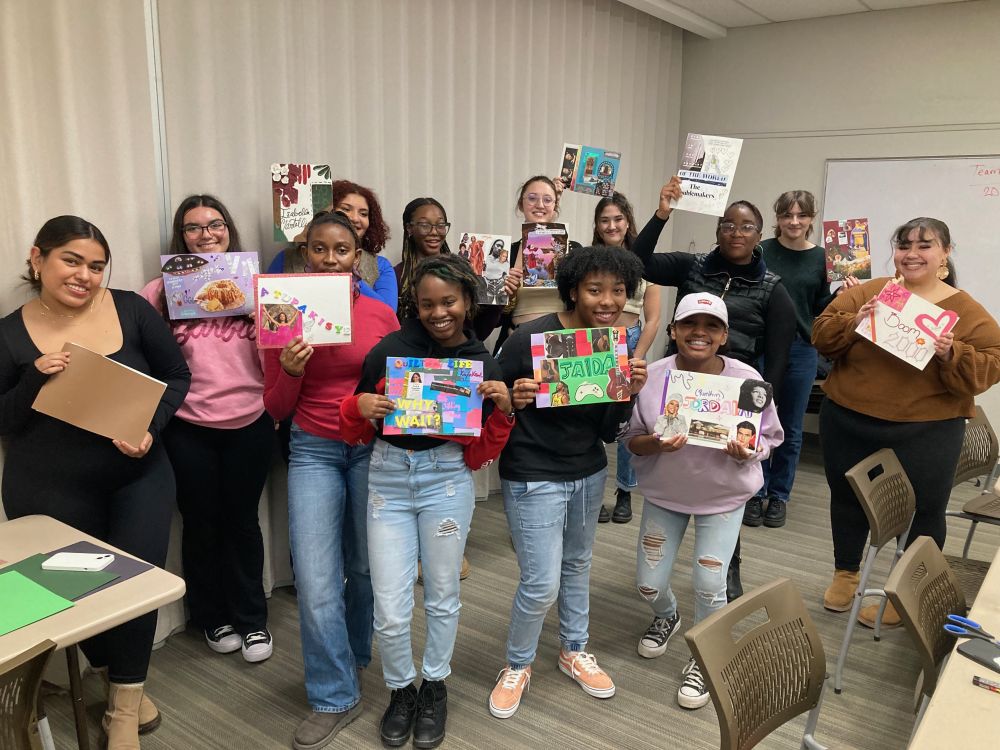
MSU students in Tama Hamilton-Wray’s Narrative Portraits participated in GGG’s Lansing chapter Saturday meetings, where they engaged in discussions and creative projects.
In fall 2023, Hamilton-Wray developed an RCAH course called Community Engagement: Narrative Portraits. “It was a really great opportunity for me to learn more about Black girlhood studies, grounded in the work we were doing with GGG,” she said.
The course explored: “How do issues of gender, race, sexuality, class, and other identities intersect with Black girls’ experiences, aspirations, challenges, and joys? What are the power structures, systemic injustices, and cultural norms that have impacted Black girls’ lives historically and in the contemporary moment? How do Black girls speak their truths, navigate challenges, build community, play, and grow?”
The course, like others Hamilton-Wray has taught, included readings about community engagement. Early on, King and Buell visited the classroom to share the mission and goals of GGG.
Hamilton-Wray’s students studied literature and film focused on the experience of Black girls, including the coming-of-age novel and film The Hate U Give. They read from an anthology of Black girlhood short stories. Those readings revealed an “adultification” of Black girls, Hamilton-Wray said. “They are seen as more mature than their age,” she said. “Black girls’ way of being is often seen as too loud, too aggressive, too boisterous. And these things get policed by teachers, by administrators, by outside society.”
Many students attended GGG chapter meetings on Saturdays. The MSU and GGG students forged bonds across different identities. “At GGG, the curriculum focuses on emotional intelligence and so they were doing some of that work alongside the adolescents,” she recalled. “I would say many of them benefited as much as the girls.”
Watching the college students and younger girls bond “made my heart swell,” King said. “I assumed it was only going to be a one-way learning. The college students were going to teach the high school students.” As their time together unfolded, the college students spoke about how interacting with the girls helped them grow.
With input from King and Buell, Hamilton-Wray and her students selected a story from the anthology to read along with the girls. As the semester progressed, the MSU students facilitated a discussion about the stories at the weekly chapters.
The students also worked on projects identified by GGG. One group worked on grant proposals; another helped update GGG’s literature.
Two-Way Learning
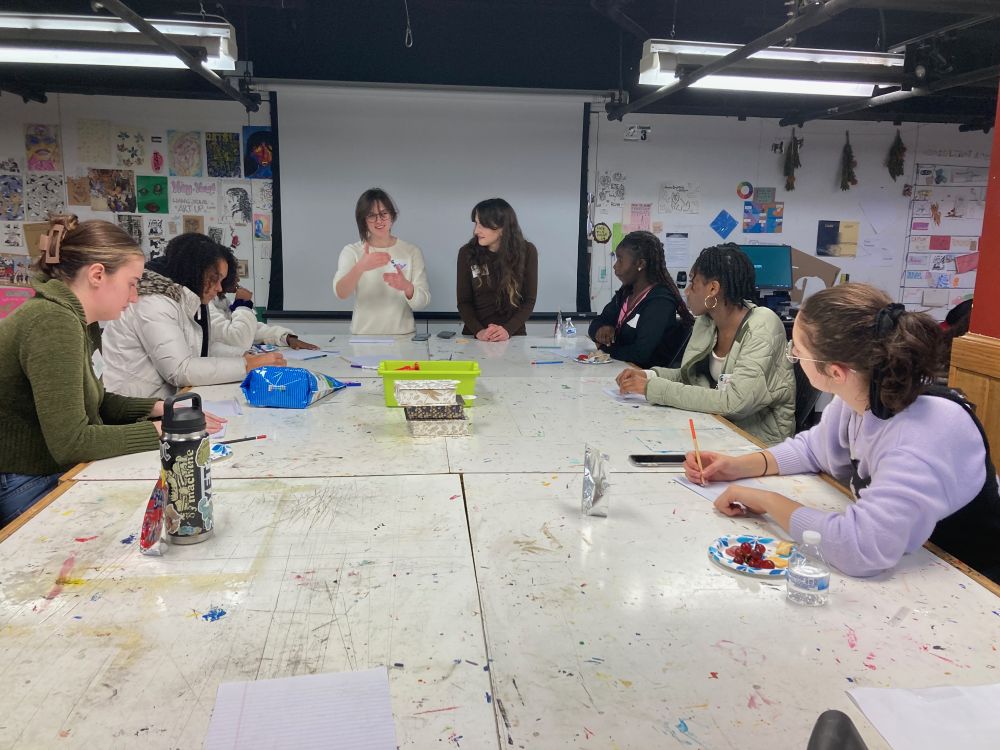
MSU students welcomed GGG to the Residential College in the Arts and Humanities for a tour and group activities, including writing a “letter to future me.”
The culminating activity was a screening of the documentary Step at RCAH. The film documents the lives of three members of a Step dance team at an all-girls high school in Baltimore.
“They loved it,” recalled Buell. “[Hamilton-Wray] really made it a beautiful, well-rounded experience for the girls,” who also engaged in art activities with the MSU students, toured RCAH, and joined them for lunch. “They got to connect with students who aren’t too far removed from their shoes.”
Throughout the course, the MSU students shared what they learned with one another and wrote reflections. The course underscored what RCAH means by “radical reciprocity” in its mission statement, Hamilton-Wray said. “When we talk about community engagement, what it means for that to go both ways—to really listen, but also to be in dialogue with someone.”
By becoming aware of the systemic injustices facing Black girls, students going into teaching, for example, can learn how to address them and avoid reproducing them.
Teaching the RCAH course offered an opportunity for Hamilton-Wray to explore the growing field of Black girlhood studies. “I had never used this lens of Black girlhood studies,” she said. Work in this area “gives me another tool for my scholarship on Black women’s literature and Black women’s film. It also informs my mentoring.”
GGG Summer Camp
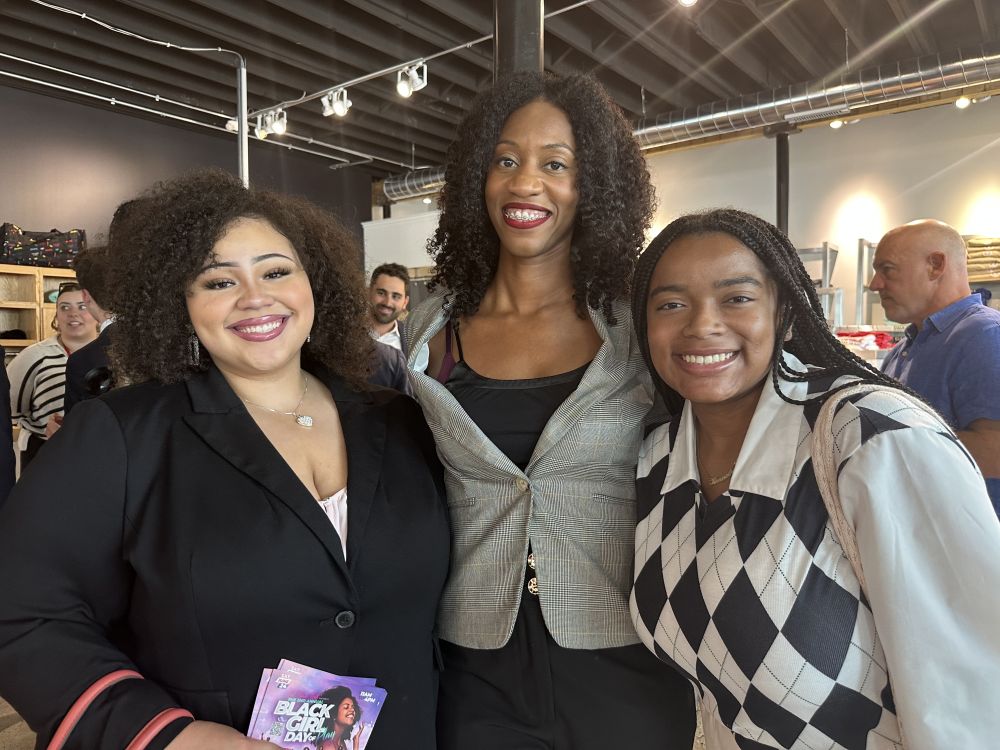
From left: Aaliyah Buell is pictured with GGG founder Cameo King and former student Kennedy Duncan.
Hamilton-Wray draws on her scholarship in film and literature as one of several professors who teach courses at a weeklong GGG summer camp at MSU. The camp exposes girls from across Michigan to campus, where they attend lectures taught by Hamilton-Wray and professors from other institutions, interact with MSU students and professors, and engage in creative activities.
“I think it’s very important for young girls to see Black women in learning spaces and in positions where they can have an impact. That is one of the big goals of the camp,” Buell said. They also get a taste of college life by living in dorms and interacting with RCAH students, including members of the RCAH Sister Circle, a mentoring program co-directed by Hamilton-Wray that focuses on students who are women of color.
Last summer, Buell directed the camp for the first time. She recalled that Hamilton-Wray even volunteered on her birthday. “She shows up with her full heart,” Buell said. “When it comes to an engaged scholar, she’s engaged. She does the work!”
Alana Mapp, a current student and member of RCAH Sister Circle, served as a camp counselor. It was a week of instilling in the girls a sense or “self-love, empowerment, well-being, and ... speaking as loud as they can,” she said. Working with GGG was so fulfilling that Mapp hopes to continue working with Black girls as a therapist or at a nonprofit after she graduates.
During the camp, Hamilton-Wray taught a course on Afrofuturism, which refers to “theoretical, philosophical, cultural, artistic, and generic practices that are concerned with the Black diasporic and African futures. It is a framework that young people can apply in imagining and putting into practice the world they wish to have—not just for the future, but for right now,” she said.
Campers toured the Afrofuturism and Quilts exhibit at the MSU Museum. Each of the girls received a square of cloth to decorate in response to a prompt in which they imagined the world or themselves 50 years into the future. The idea was to encourage the young people to engage in the power of their voice, which is central to GGG’s mission. One student, for example, created a patchwork that represented the many sides of herself present and future.
Buell, who is studying for her master’s in public administration at University of Michigan, said she looks forward to joining forces with Hamilton-Wray again this summer.
“I think she got bit by the GGG bug,” Buell said. “I love seeing the way she engages with the students and just the energy she brings,” she said of the woman she describes as a trailblazer, mentor, and mom to many. “I think it does her heart good to be in spaces like that. It is that two-way street where there’s mutual learning taking place.”
- Written by Patricia Mish, University Outreach and Engagement
- Photographs courtesy of Tama Hamilton-Wray and Grit, Glam, and Guts unless otherwise indicated.